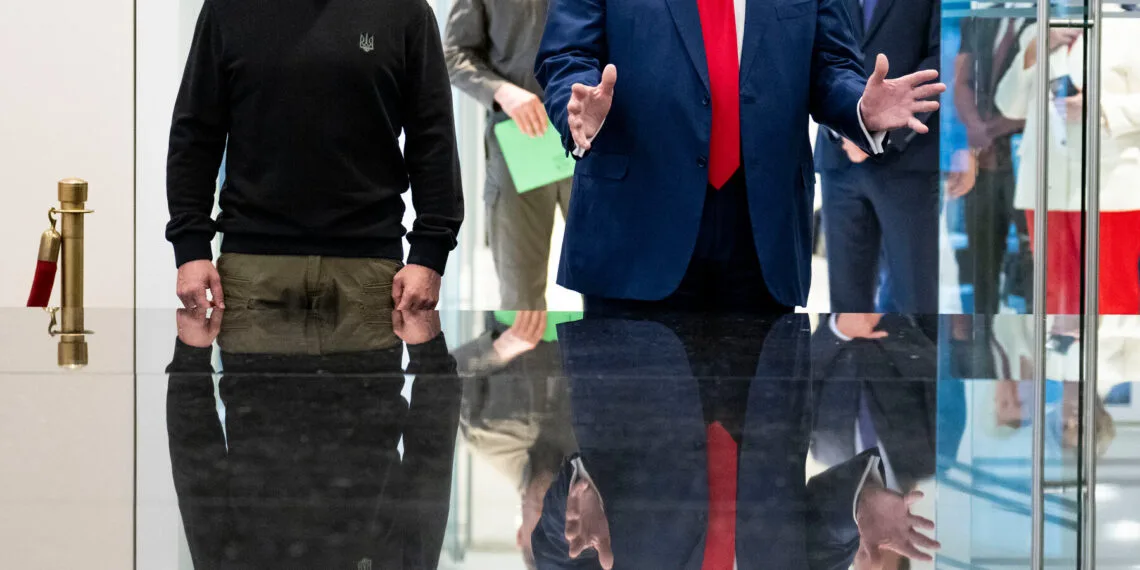The Gist:
On Friday, former President Donald Trump expressed his belief that Russian President Vladimir Putin desires an end to the ongoing conflict between Russia and Ukraine. This statement reflects a perspective that suggests a possible willingness from the Russian side to cease hostilities. However, it raises questions about the nuances of international diplomacy and the complex realities of the situation.
Ukrainian President Volodymyr Zelensky, on the other hand, firmly stated that the war should never have begun in the first place. His comments highlight the perspective of Ukraine, which views the invasion as unprovoked and unjust. The contrasting views of these two leaders illustrate the deep divide in how each side perceives the conflict and its origins.
The Good:
- Potential for Peace: Trump’s comment may encourage dialogue about ending the war, which could lead to a peaceful resolution, benefiting both nations.
- Global Awareness: The discussion around the war helps raise awareness of the conflict, prompting international support for peace efforts and assistance to affected civilians.
- Openness to Solutions: By implying that Putin wants peace, it may create a more hopeful environment for negotiations and compromise.
- Engaging Leaders: High-profile discussions can lead to more leaders engaging in the conversation about ending the conflict, which is needed for any meaningful resolution.
- Highlighting Ukraine’s Stance: Zelensky’s remarks emphasize the importance of addressing the roots of the conflict, urging the international community to understand Ukraine’s perspective.
The Bad:
- Misinterpretation of Intentions: Trump’s statement may wrongly suggest that Putin’s intentions are more peaceful than they actually are, potentially downplaying the severity of the situation.
- Mixed Messages: Public comments from influential figures can create confusion about the realities of the war, potentially undermining Ukraine’s fight for sovereignty.
- Risk of Complacency: A belief that peace is on the horizon might lead to complacency among international leaders, delaying necessary support for Ukraine.
- Damage to Diplomatic Efforts: Such remarks could complicate diplomatic efforts, especially if they are viewed as endorsement of Putin’s actions.
- Increased Tensions: Contrasting statements from leaders may heighten tensions, creating a more challenging environment for negotiations.
The Take:
Former President Donald Trump recently commented on the ongoing Russia-Ukraine war, suggesting that he believes President Vladimir Putin wants to see an end to the conflict. Trump’s statement hints at a perspective where peace could be possible, though he does not provide substantial backing for this claim. This view reflects a continuously evolving international dialogue regarding the war, which has seen significant tension, violence, and loss over the past months. The hope behind such comments is that they might inspire further discussions among world leaders about how to achieve peace.
In contrast, Ukrainian President Volodymyr Zelensky firmly stated that the war should never have happened. Zelensky emphasizes that the conflict was not initiated by Ukraine but rather by the actions of Russia, highlighting international law and the need for sovereign nations to be respected. His comments drive home the harsh realities faced by Ukraine since the outbreak of the war and underline the importance of understanding the narrative from Ukraine’s perspective.
The differing attitudes presented by Trump and Zelensky showcase the deeply divided views regarding the motivations and desires of the involved parties. While Trump suggests hope for negotiations, Zelensky’s firm stance reminds the world of the consequences of aggression and the inherent rights of nations. This brings forth a vital need for dialogue that respects both sides’ realities.
The Russia-Ukraine war has drawn significant global attention, and comments from influential leaders like Trump and Zelensky can greatly shape public perception. While some may find a glimmer of hope in discussions about stopping the conflict, others might perceive such comments as trivialising the hardships faced by the Ukrainian people. The ongoing violence and humanitarian crisis require careful handling to ensure that discussions about peace do not unintentionally undermine the gravity of the situation.
As the world watches, the response from international communities is crucial. Being mindful of the implications of these discussions is essential to foster a fair dialogue that considers the sufferings endured by so many. The emphasis should be on finding a viable solution to cease hostilities while recognising and addressing the fundamental issues that led to the war. In times like these, strong diplomacy and a commitment to understanding differing narratives are paramount to building a future that prioritises peace and stability.





































































